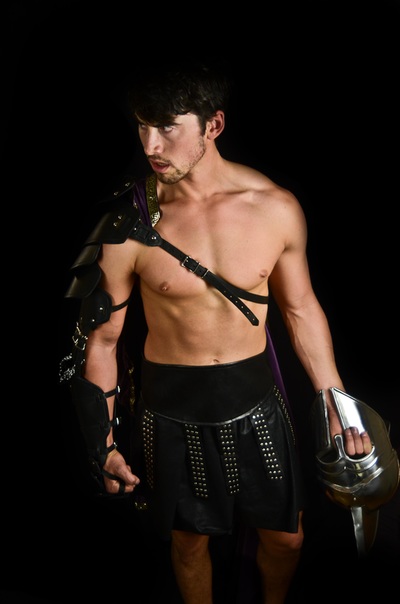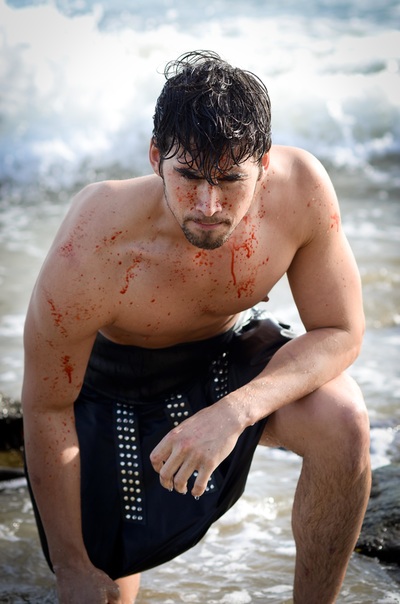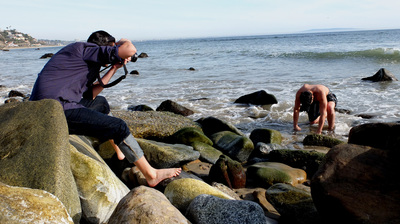|
When I first began toying with the idea...what if you could see the mythological stories surrounding the major figures of the Homeric tales (the Iliad and the Odyssey) in a seamless telling? The cast of characters is a celebrity Who’s Who in the world of ancient Greece: Achilles, Paris, Hektor, and Odysseus. But, you can’t begin to tell their stories without reaching beyond what Homer provides and dig into other mythological cannon to discover more about Helen, Hecuba, Cassandra, Andromache, Leda, Deidamia, Priam, Agamemnon, Menelaus, Tyndareus, Peleus, Thetis, and Chiron. Then, there’s the pantheon of gods and goddesses to contend with. The major heroes of Homer’s tales are entwined with other characters and to get a sense of how that’s even possible, I had to dig deep and make some choices. I used the events of the Iliad and the Odyssey as the backbone of the chronological story. But after days of compiling data, I realized the task was much more difficult than it seemed. The original storytellers weren’t trying to make chronological sense of the various stories. The first glitch was the Paris and Helen myth. Everyone who’s familiar with the story assumes that Paris gives the judgment of the fairest to Aphrodite, who has promised him the love of the most beautiful woman in the world, Helen of Sparta. Soon after, Paris goes to Sparta and absconds with Helen and sails back to Troy. This widely held assumption is, well, wrong. Let’s examine why. The golden apple event that occurred was at the wedding feast of Peleus and Thetis. These are Achilles parents. So, Achilles, the greatest fighter of all the Greeks has NOT been born yet. He’s the star of the Iliad. The Muse sings about his wrath, his undoing of character after Agamemnon humiliates him and his cousin and comrade, Patrokles, was killed. So, the judgment Paris gives about who the “fairest” goddess is takes place soon after the wedding feast, before Achilles is conceived or born. Bottom line, we have to wait at least 15 years for Achilles to grow up, get trained, and father a son BEFORE Odysseus can discover him on Skyros, dressed like a girl and call our hero into action. This means two things: Paris has to be at least 15-18 years old to be considered MAN enough to judge the female flesh; therefore, he’s 15-18 years older than Achilles. Most movies and books depict Paris and Achilles about the same age. But they can’t be. Paris is definitely his elder. The other question in this story is: When does Paris meet and woo Helen? And how old is Helen? Paris couldn’t have taken off with her any time soon following the judgment because that would mean they’d be in Troy for years before Menelaus even tried to get her back. Even if you take the whole jaunt to Egypt bit seriously, that still leaves too many years in between the kidnapping and the attempted rescue. Remember, no matter what, Achilles has to be old enough to lead the Myrmidons (some sources say Achilles was 15 when he went to Troy. (I gave him a few more years to make it more plausible, using Alexander the Great as a close model. Alexander led his first troops into major battle, under his father’s command, at Chaeronea at age 18). So, if Helen were already born and left with Paris shortly after the judgment, she’d be away in Troy for 15-18 years before Menelaus went for her because he’d have to wait for Achilles to be born and grow up. That makes no sense. Also, there is the first kidnapping Helen endures by Theseus when she was just a young girl, probably pre-teen around 12 or 13. She’s the hostage of the king of Athens, or rather his mother’s hostage, until she’s eventually rescued by her brothers, Pollux and Caster, and taken safely back to Troy. She is married to Menelaus shortly after this event to secure her safety and the safety of Sparta. Menelaus did not marry an old maid. Helen would have been about 15-18 years old. This is the young queen of Sparta who was seduced by a much older Paris. Their elopement/kidnapping is the precipitating event of the Trojan War. This is the dogma of the mythology surrounding Troy that we can’t alter. Therefore, Helen is most likely Achilles age. She would’ve had to been born about 15-18 years before the ships launch to rescue her. Achilles would’ve had to been born at least 15-18 years before he led the Myrmidons across the sea to Troy. Paris is in his 28-30 and Helen and Achilles are contemporaries at 15-18 years of age. This means Paris has an entire life he lived as a man, long enough to be abandoned by Priam, raised by Agelaus, married to his first wife, a nymph named Oenone and to have a son with her named Corythus. He also had to be discovered by Priam and re-embraced as family. Then sent by Priam to rescue Hesione, Priam’s sister, who was kidnapped by Herakles...you get the picture. One thread wraps around another thread and so on. And yes, some times the “trying to make sense of it” turns what we think we know on its head. I read a review of Song of Princes, by Nadine Paque-Wolkow, she said, in reference to the ages of Paris, Helen and Achilles, “...this may sound like a good idea so first, but I was nervous when Paris was still a child at 30% of the book. Then there was a small leap in time, Paris is now 18, but neither Achilles nor Helena are even born. I admit that I can not recite the dates of birth of all Trojan hero from the head, but in my head [it] is all messed up, just because I already (through books and films etc.) had a picture of all. Also, I glanced back to the percentage display...Half the book was almost already read! Helena was a baby and Achill[es] five at scarce 50%. Hector but already late twenties! And there are still decades until the big final battle of both the gates of Troy! For me, most people had therefore a completely wrong age and everything felt ... wrong and strange.” I think a lot of readers may also have this initial dissonance about the dates and timeline, because most films and books haven’t tried to put a logical chronology to the mythology. (I have a very detailed timeline in the front of the book.) I’ve tried to do just that. By leaving the seduction/kidnapping/eloping of Helen with Paris as the definitive catalyst of the war, it has made several other elements of the entire story sync together in a way most people haven’t thought of, or even entertained. That and there are the many fragments and other sources for these characters besides Homer that had to be integrated. And if that doesn’t get your stars in a twinkle, think about this. The Iliad begins almost a decade after the ships disembarked from Aulis for Troy, making every hero and heroine ten years older when we read about them, than when they set out on the adventure. They are all full grown men and women by the time we see them in action in Homer’s tales. I welcome comments and questions. And again, I thank Nadine for her thoughtful and detailed review of book one of the Homeric Chronicles. It certainly made me get this blog about the timeline question out in a timely fashion :) Here’s the link to Nadine’s original post. It’s in German, but you can easily translate it to English in Google Translate. Happy reading!! http://meineliteratour.blogspot.de/2016/07/rezension-song-of-princes.html If you enjoyed this post, give it a LIKE or a TWEET :) And by all means, SHARE :) If you'd like a heads up on future Big Ten Interviews or giveaways, join my email list. The only spam I like is with my eggs. © Janell Rhiannon 2016 Any information from this blog must be properly cited :)
29 Comments
Ron
2/25/2023 06:10:39 am
Reconstruction of the timeline always misses Oenone's age. What is the best resource for that and Corythus age when he meets Helen?
Reply
Janell Rhiannon
2/25/2023 09:20:07 am
Oenone is immortal, so no age-- I placed Corythus at Troy in 1239 BCE--at 17/18 where he remains for the next year or so.
Reply
Niser
2/1/2024 05:59:46 pm
Out of curiosity, what's your rationale for Helen being 15-18? Did we ever get any real info on when she was married, or when she was seduced/kidnapped?
Reply
Janell
2/4/2024 08:02:27 am
Thank you for the Q! We know the story of Helen being kidnapped by Theseus when she was a young maiden 12-13 ish. After this experience, her father realizes he must marry her off for her own protection— think of it. She’s been a target once and likely will again. Within a short time period she is married to Menelaus. She has to sit the throne as Queen for long enough to conceive Hermione (and be old enough for this) and time for Paris to arrive and she leaves with him… my references should be mentioned in the podcast. Hope this answers your question :)
Reply
4/3/2024 09:33:35 pm
Such a great piece! Thank you so much for sharing all this wonderful information.
Reply
4/4/2024 08:11:52 pm
I think this plot really works because of how well you’ve paced the story.
Reply
4/7/2024 03:21:17 am
Your writing always makes me want to become a writer, too.
Reply
4/7/2024 03:25:12 am
You make it seem so effortless, but I know you must have worked hard on this.
Reply
4/7/2024 03:27:07 am
This sentence really grabbed me. I love the way you structured it.
Reply
4/7/2024 03:29:16 am
How did you learn to write when you were just starting out?
Reply
4/7/2024 03:30:05 am
Is there anything I should be doing if I want to write like you?
Reply
5/9/2024 10:25:21 am
I generally thought that Achilles was younger at the start of the war. That he was still a child, under the care of his uncle, Patrocolus. Living as a girl, he impregnated another girl. He could have been as young as 12 or 13 at that time. It wouldn't have been unusual to join the war at a young age and participate like a squire of sorts to an older male. If Achilles was leading his men at the start, he would have won the war earlier. It feels like he's just getting started at the start of the Illiad. Like, he's finally old enough to lead and he's showing is prowess, which is starting to give the Greeks hope that the war will end. In my head, that means that at the beginning of the Illiad, he's still in his early 20s. Thoughts?
Reply
5/24/2024 01:48:09 am
Your writing is so beautiful because you always know the right word for the right moment. I’ve studied your work a lot, and I’m trying to get better at writing myself!
Reply
Leave a Reply. |
Author
|



 RSS Feed
RSS Feed